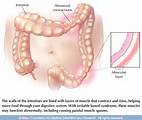I am still one day behind. I will catch up tomorrow – fingers crossed. So for now, I am going to talk about Irritable Bowl Syndrome (IBS). It is a well-known condition in adults, but few know that it affects children also. The definition of IBS, according to Children’s Health Network is: A chronic disorder of the large intestines (Colon) that causes annoying and often painful abdominal and bowel symptoms. IBS is considered a functional bowel disorder which means that the bowel does not always work normally. Although IBS can cause much distress, when the colon is examined visually there is no evidence of damage to the tissues. IBS is not a disease. It is a disorder made up of certain symptoms. There are usually some flare-ups of symptoms throughout the child’s life. There is no cure, but can be controlled. There are several symptoms. The main symptoms are diarrhea and pain. Others are: Bloating, cramping, chronic or intermittent constipation, urgency with defecation, incomplete sensation of defecation, and passage of mucus on the stool. The child’s symptoms may be due to abnormal motility in the large intestines, stress, overgrowth of bacteria in the bowel, or hypersensitivity to the stretching and motion in the intestines Sometimes children may eat less to avoid the pain. This could cause the child to lose weight. The children that often have diarrhea may not want to go to school or be around other children. IBS may cause the child to become depressed or anxiety.
Nobody knows exactly what causes IBS, but with a detailed medical history with a list of the child’s symptoms, the health provider will do an abdominal and rectal exam. The diagnosis is usually based on his findings. There are some tests that he may order such as blood tests, test of fecal sample, hydrogen breath test (to check for lactose sensitivity), a colonoscopy to see the inside of the colon, and a barium enema.
The parents are usually told to try some changes in the child’s diet such as: Gluten free, more or less high-fiber food, smaller meals several times a day instead of 2 or 3 larger meals. The healthcare provider may ask the parents to avoid carbonated drinks, cabbage, and beans. Also, to observe if certain foods seem to cause the symptoms by keeping a food diary for the child.
Some medicines may be prescribed to relieve the symptoms such as: Bulk-forming agents (bran or methylcellulose, antispasmodic drugs to slow contractions (helps with diarrhea and pain), antidepressants, (helps control chronic pain), and medicines to help with constipation or diarrhea.
Stress could be a factor in the child’s symptoms and the parents should help identify things that cause stress and suggest ways to help control them. Sometimes relaxation or biofeedback techniques may help manage the stress.
When the above suggestions are established with good results, then the diagnosis of IBS is positive and the main objective is to restore normal daily function.
References: Pediatric Advisor 2014 published by Relay Health
Beaumont Health Systems 2013
Disclaimer: The resources on this site should not be used as a substitute for professional medical care or advice. Users seeking information should consult with a qualified healthcare professional.




I originally taught I had this only to discover that developed Crohn’s, which so embarrassing. I mean you talk about bleeding when you go to the bathroom and so incredible painful, I remember one particular bad day when had to leave work because of it. Today on I keep under check and have no problem
LikeLiked by 1 person
That is wonderful that you keep it under control. It is such a painful illness.
LikeLiked by 1 person
I be honest I have never experience anything more painful, than it. The only thing that slightly comes close is post-surgery pains
LikeLiked by 1 person
Yes. Those are bad too.
LikeLike
IBS is such a nasty thing I know that personally I find it stressful I would imagine it must be difficult for both children and parents.
LikeLiked by 1 person
I can only imagine how hard that must be.
LikeLiked by 1 person
Again all I say is at least I know my enemy children have to learn too.. Doesn’t seem fair.
LikeLiked by 1 person